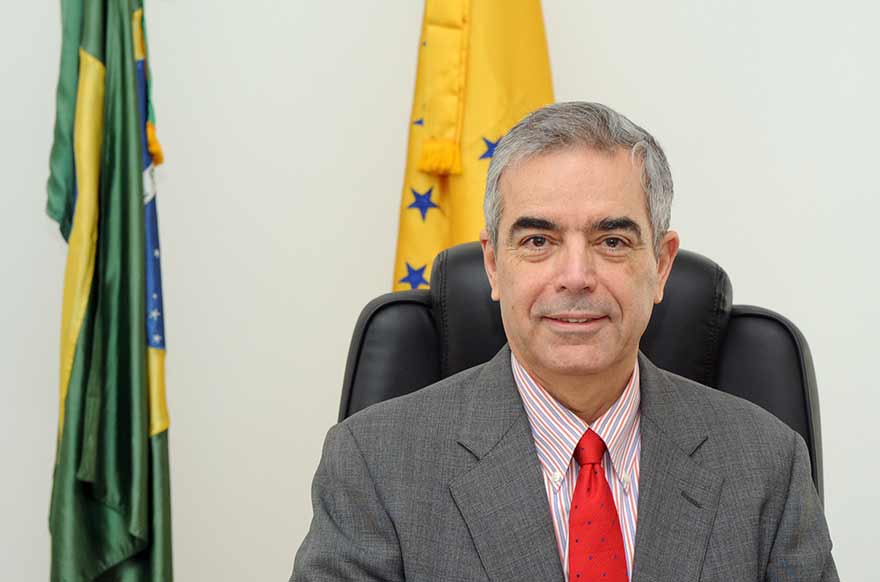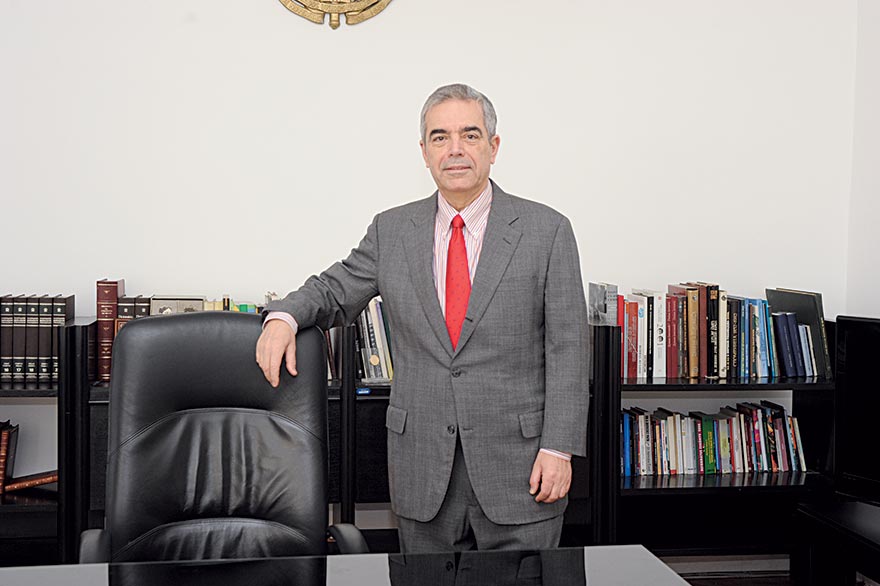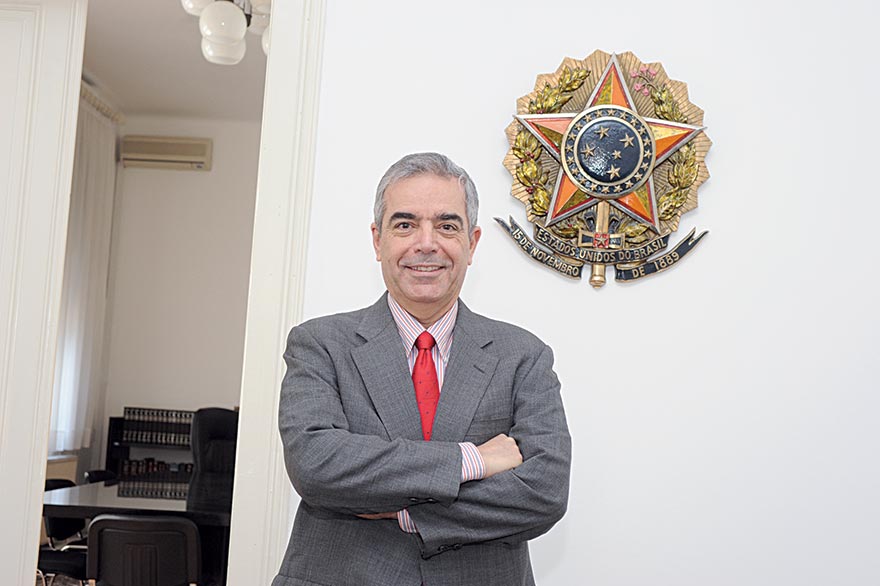Brasilia and Belgrade defend values and principles that contribute to a safer, more peaceful world, such as the defence of multilateralism and promotion of the rule of law in international relations ~ Eduardo Botelho Barbosa
The more you know Serbia, the more you like it, says Brazilian ambassador Ambassador of Brazil to Serbia Eduardo Botelho Barbosa, who is approaching the completion of the first year of his residency in Belgrade. Speaking in this interview for CorD Magazine, this Brazilian diplomat reiterates his country’s commitment to jointly fighting for the rule of law in international relations, but also talks about the successful privatisation of Serbian company Galenika, which – provided plans to restore the significance of this former pharmaceutical giant prove successful – could provide encouragement to invest in Serbia among other Brazilian investors.
Your Excellency, you stated recently that you are satisfied with your residency in Serbia to date, after having arrived less than a year ago. What do you like about it in particular?
My wife, Monique, and I are very happy to be here, in beautiful Belgrade, which radiates with European charm. We arrived in early February and are still familiarising ourselves with the impressive cultural and leisure possibilities of this truly endearing capital. It is easy and comfortable to live here. The people of Belgrade have been unfalteringly friendly. As we get to travel around Serbia and better understand the ways of the land, we are increasingly fascinated by this society. In my experience, the more you know, Serbia, the more you like it. And the varied gastronomy and quality of wines are another pleasant surprise!
Your posting to Belgrade began during the year marking the 80th anniversary of the establishment of bilateral diplomatic relations. Do you share President Vučić’s assessment that Brazil is one of Serbia’s most important political and economic partners in Latin America?
The bilateral relationship between Brazil and Serbia goes back a long way. We are celebrating 80 years since the first exchange of resident ambassadors. Thanks to the Archives of Yugoslavia, the official relationship has been documented in an exhibition that is to be held in November on their premises, along with the publication of an accompanying catalogue.

The dialogue between our two governments has been consistently based on mutual respect and has always been friendly and collaborative. Brasilia and Belgrade defend values and principles that contribute to a safer, more peaceful world, such as the defence of multilateralism and the promotion of the rule of law in international relations. Very importantly, we also coincide on human rights.
The economic dimension is also relevant: Brazil is an open, global trader. We are the second-largest economy and second-largest market for Serbian products in the Americas.
You spoke in another recent interview about Brazil’s adherence to Resolution 1244 and its unchanged stance regarding the provisions of international law as they relate to the sovereignty and territorial integrity of Serbia. How would you comment on the fact that there are strong voices on the international scene, including in the UN, suggesting that the time has come to withdraw that resolution?
UN Security Council Resolution 1244 (1999) is central to Brazil’s unwavering position on the Kosovo issue, so we don’t agree that it has become irrelevant. As you know, besides Brazil, many other major countries – including European ones – adhere to Resolution 1244.
In line with this Resolution, Brazil supports the sovereignty and territorial integrity of Serbia, and a political solution that allows both parties to solve their issues. Resolution 1244 is not about empty words!
Brazil is an open, global trader. We are the second largest economy and second largest market for Serbian products in the Americas
I also believe that the rewards of reaching a solution will include the reinforcement of the pace of socio-economic development of both Serbia and Kosovo. As President Vučić himself pointed out, solving the Kosovo issue is crucial to the future of the Serbian nation, and, I would add, to wider regional stability.
You noted at the start of your mandate in Serbia that there is room to advance economic cooperation between Brazil and Serbia, citing agriculture and the pharmaceutical industry as areas where such advances could come the fastest. Were you thinking of some specific investments?
Exports to Serbia total around US$110 million, while imports total US$16 million. There is a Brazilian investment in the local pharmaceutical sector. Tourism from Brazil is still in its infancy but is noticeably on the rise. I am optimistic about the future: Serbia’s growth is back on track and, I believe, will increasingly attract the attention of Brazilian companies. One of the main activities of my Embassy is to promote commercial cooperation with Serbia.
Galenika, Serbia’s former pharmaceutical giant, was sold to Luxembourg-based Aelius – a branch of Brazil’s EMS S/A – two years ago. Could you tell us something about this investment and the current situation at Galenika?
The acquisition of Galenika in 2017 by EMS S.A. represents the first major Brazilian investment in Serbia. In the short time that’s followed, the company has undergone modernisation, its financial health has been restored, and operations returned to profitability. Exports are on the rise. Galenika is on the right path to regaining its previous importance, which will, in turn, create more job opportunities in the Belgrade area. We hope that the Galenika experience will encourage other Brazilian companies to seize the opportunities offered by the Western Balkan market by coming and investing in Serbia.
How far have negotiations advanced when it comes to bilateral agreements between Brazil and Serbia in the areas of justice, education and air transport?
We have six agreements currently under negotiation, comprising one Air Services Agreement, four agreements in the area of justice, and a Cooperation Agreement in the field of education. Most of them are at a very advanced stage. These instruments cover specific issues of interest to both parties and signal their wish to reinforce bilateral cooperation.
We hope that the Galenika experience will encourage other Brazilian companies to seize the opportunities offered by the Western Balkan market by coming and investing in Serbia
The world was shocked by this summer’s images of wildfires in the forests of the Amazon. What is the current situation?
The fires in the Amazon region are a matter of huge concern for Brazilian society and the government. It’s important to bear in mind, however, that the situation in the Amazon – though serious – was much less dramatic than reported by the international media.
Fires are more frequent in my country from June to October, because that is the dry season. So far, 2019 has been exceptionally hot (as is the case all over the world, unfortunately). Many Amazonian countries (60 per cent of the Amazon is in Brazil) suffered even greater fire activity than Brazil, compared to the same period of 2018.

Historical records show that the fires registered between January and August 2019 were in line with those recorded in the previous years, only slightly exceeding the average between 1999 and 2019. Based on these records, it’s not possible to infer that the increase reported for 2019 reflects a tendency.
President Jair Bolsonaro launched a huge operation in last August to reinforce the fight against environmental crimes and wildfires, coordinated by a central command centre established in Brasilia. Satellite data showed a quick decrease in the number of fires after the launch of this ongoing intervention, which has to date mobilised 8,000 personnel, 220 vehicles, 60 vessels and 11 aircraft.
Since the beginning of the operation, 1,500 fires have been tackled, 68 people have been detained, and more than 10 million euros has been issued as environmental penalty fees. Many countries have offered their solidarity and are helping us in this emergency, including – among others – Argentina, Chile, Ecuador, Israel, Japan and the United States.
Could you speak in more detail about the causes of the fires and the possible human factor, given that it has been mentioned that the fires could be the result of tactical attempts by individual farmers to expand the area covered by their crop fields?
The main challenge in the Brazilian Amazon, which represents an area equivalent in size to the entire territory of Western Europe, is fighting illegal practises. Seventy per cent of all deforestation takes place outside rural estates, i.e. on public and unclaimed land. The blame lies with illegal activities, such as unlawful occupations of land and unauthorised logging.
I would like to emphasise that deforestation rates in the Amazon region have declined significantly, from 27,700km² in 2004 to 7,500km² in 2018, representing a reduction of 72 per cent. In February 2019, Brazil became the first country to receive payments (totalling US$96 million) from the Green Climate Fund for environmental services of decreased deforestation.

Brazil has increased its agricultural production more than sevenfold over the last 40 years, whilst using only 30 per cent more land. This reduced the pressure on conservation areas. More than 60 per cent of my country’s landmass is covered by native vegetation, with farming limited to approximately 30 per cent of the territory, eight per cent of which is cropland, while approximately 22 per cent is dedicated to livestock farming. It is a much lower usage of the land base than in Europe.
This case has also gained a political dimension following Brazilian President Bolsonaro’s statement that the most powerful countries in the world approach the problem of these fires in a “colonial way”, by interfering with Brazil’s internal affairs. What prompted such an assessment?
Quoting President Bolsonaro, the situation in the Amazon, though pressing, has to be addressed with serenity. The spread, even by foreign authorities, of scientifically unfounded affirmations, does not help to solve the problem, and lends itself to political use and misinformation of the public. Wildfires happen all over the world and should not be used as a pretext for the imposing of international sanctions.
Some sectors in our export markets seek to associate Brazil with the destruction of the environment in order to pressure us on trade issues and to influence consumers negatively. There is clearly a protectionist agenda behind these attacks.
Brazil has solid credentials in the area of sustainability and on the international environmental agenda. Bolsonaro’s message is that Brazil is aware of its sovereignty and responsibility for the protection of the Amazon rainforest and the environment.
Brazil became the first country to receive payments (totalling US$96 million) from the Green Climate Fund for environmental services of decreased deforestation
Despite President Bolsonaro having sharply criticised the alleged attempts of major powers to meddle in Brazil’s domestic affairs when it comes to the Amazonian wildfires, in neighbouring Venezuela Brazil has sided with opposition leader Juan Guaidó, who speaks openly about the support he receives from Washington. What caused most neighbouring countries to turn against
President Maduro? Nearly 180,000 Venezuelan refugees have taken shelter in Brazil. My government passed legislation, dubbed “Operation Welcome”, to help them settle. They are part of the more than four million Venezuelans (source: UNHCR) of a population of 28 million that have had to flee the economic collapse of Venezuela’s economy. These numbers are expected to keep growing. This is a humanitarian crisis of epic proportions never before seen in the Americas, which impacts on nearly all countries in that part of the world.
Members of the LIMA Group, including Brazil, didn’t oppose the new sanctions imposed on Venezuela by the U.S. Do you share the concerns of Michelle Bachelet – current U.N. High Commissioner for Human Rights and a former President of Chile – who wrote in her recent report that economic sanctions only serve to worsen the economic situation and deepen the humanitarian crisis?
The 11 American countries that comprise the Lima Group, which includes Brazil, impose sanctions on Venezuela but oppose violence. The sanctions imposed by the U.S., which is not a member, are supported. Although sanctions will also impact on the most vulnerable people, who have already suffered too much, they are necessary to bring the Maduro regime to the negotiating table with the democratic opposition. The Group also calls on the UN Human Rights Council to monitor and investigate the situation in Venezuela.
Brazil fully supports president, interim, Juan Guaidó, who was designated by the regularly elected National Assembly, in his efforts to re-establish democracy. Mr Guaidó enjoys widespread support and recognition from nearly 60 other countries, while Mr Maduro is increasingly isolated.
| RESOLUTION 1244
Resolution 1244 is not about empty words! |
TRADE
Exports to Serbia total around US$110 million, while imports total US$16 million |
AMAZON
The main challenge in the Brazilian Amazon is fighting illegal practices |
|---|